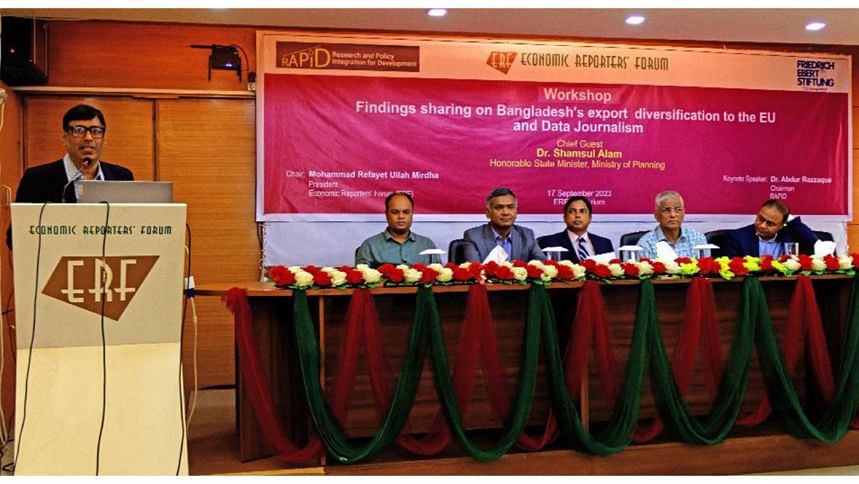‘Negotiate with EU to ease GSP Plus conditions’

Bangladesh should negotiate with the European Union (EU) to soften some provisions in the proposed Generalised System of Preferences (GSP) Plus since the country has extra time to do so after the EU extended the tenure of the existing GSP status up to 2027, an economist said yesterday.
The new GSP Plus was supposed to come into effect from January 2024 and last 10 years up to December 2034, but the EU parliament could not reach a consensus on some provisions.
As a result, the current GSP was extended up to 2027.
"So, Bangladesh has got additional time to negotiate with the EU," said Mohammad Abdur Razzaque, chairman of the Research and Policy Integration for Development (RAPID) at a workshop on "exploring export diversification opportunities in the EU" and "Data Journalism" at the Economic Reporters' Forum (ERF). The workshop was jointly organised by the ERF, RAPID and Friedrich Ebert Stiftung (FES).
Article 29 of the proposed GSP Plus scheme stated safeguard measures for textile, agriculture and fisheries industries if the share for the relevant product exceeded 6 percent of total EU imports and exceeded the product graduation threshold, which is 37 percent for textiles.
Bangladesh's textile threshold has already crossed 55 percent under the GSP scheme.
Given that context, Razzaque said that Bangladesh should negotiate with the EU to ease this article so the country could continue to enjoy duty benefits from the EU even after Least Developed Country (LDC) graduation.
Bangladesh can earn an additional $23 billion through exports to the EU if products could be diversified, Razzaque added.
Last year, Bangladesh exported goods worth more than $25 billion to the EU, of which more than 92 percent were garment items.
Vietnam exported 5,140 kinds of products to the EU and Malaysia exported 4,740 varieties of goods compared to Bangladesh's exports of 2,600 varieties of goods.
Of the total imports of cotton-made garment items in the EU in a year, 35 percent is supplied by Bangladesh.
"Bangladesh is the king in supply of cotton-made garment items to the EU. But excessive dependence on cotton-made garment products to the EU could be a cause for concern. It's time to move into non-cotton items," Razzaque added.
On July 4 2023, the European Commission announced through an explanatory memorandum that it was proposing to extend the validity of the current GSP Regulations for an additional four years or until December 31, 2027.
If Bangladesh can enjoy duty-free facilities to the EU for an additional seven years, the country can also grab more market share of non-cotton businesses, he said.
Razzaque also blamed protectionism in the domestic market for the slow diversification of exports, saying manufacturers preferred the local market to the international market.
At the event, State Minister for Planning Shamsul Alam said that people were under pressure due to high inflation.
"High import tariffs are also responsible for high prices of commodities. Inflation also increased in August this year. If the supply of commodities is restored, inflation may decline," he said.
Shadhan Kumar Das, programme advisor to the FES Bangladesh, M Abu Eusuf, executive director of RAPID and ERF President Mohammad Refayet Ullah Mirdha also spoke. Assistant General Secretary to the ERF Mizanur Rahman moderated the event.

 For all latest news, follow The Daily Star's Google News channel.
For all latest news, follow The Daily Star's Google News channel. 



Comments